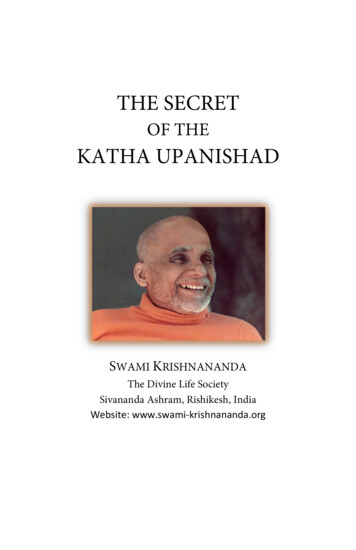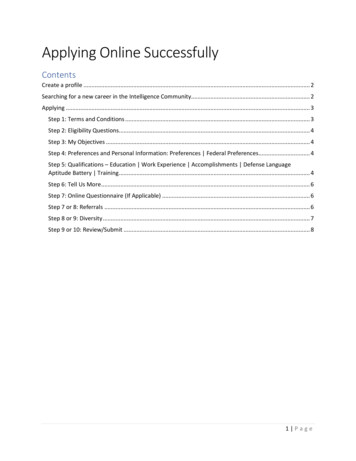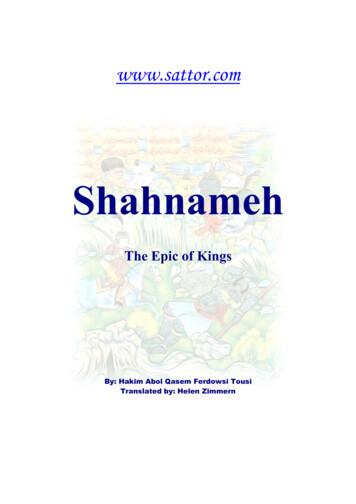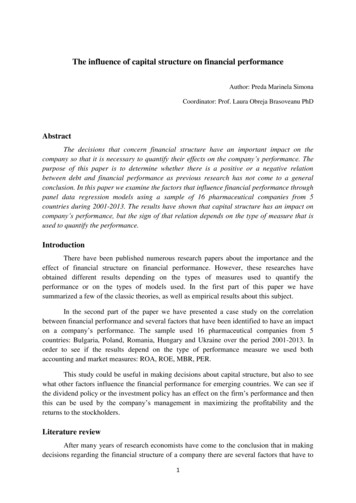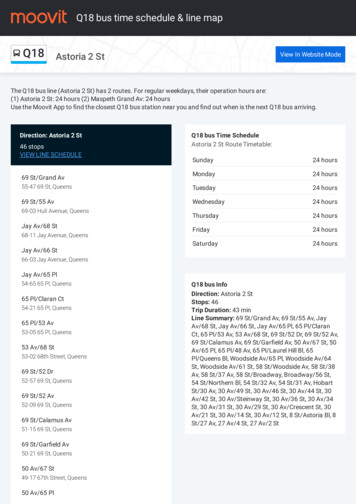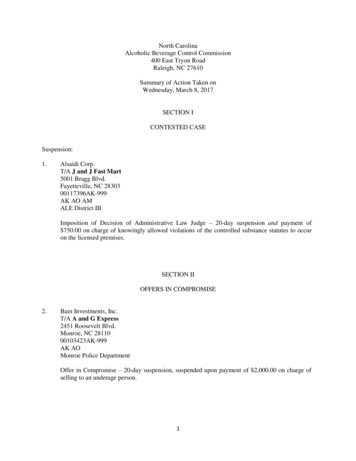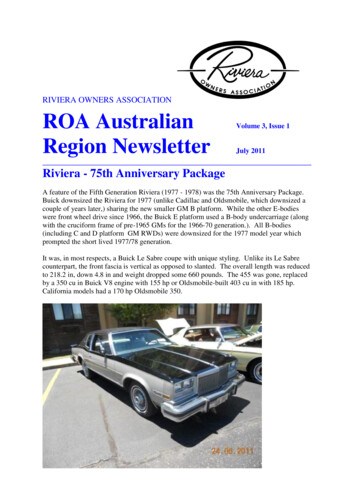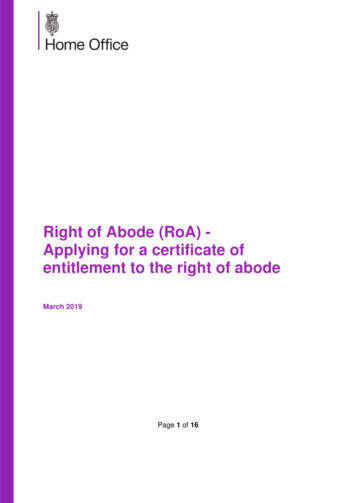
Transcription
Right of Abode (RoA) Applying for a certificate ofentitlement to the right of abodeMarch 2019Page 1 of 16
ContentsContents . 2Introduction . 3The right of abode . 4Who has the right of abode? . 4People who became British citizens on 1 January 1983 . 4People who became British citizens on or after 1 January 1983 . 5Commonwealth citizenship . 6Certificates of entitlement . 8Documents . 9Explanation of terms. 14Page 2 of 16
IntroductionThis guide explains the meaning of right of abode in the UK under the ImmigrationAct 1971 and describes, in general terms, which people have that right. It alsoexplains, for those people who may have to prove their claim, how to obtain acertificate of entitlement to the right of abode in the UK. The notes at the end of thisguide explain some of the terms used. Under regulations relating to certificates of entitlement to the right of abode youwill not qualify for a certificate of entitlement to be placed in your foreignpassport or travel document if you hold a UK passport describing you as aBritish citizen or as a British subject with right of abode.You will not qualify for a certificate of entitlement to the right of abode if you havea valid certificate of entitlement in a different passport. For example, if you havean Australian and Canadian passport, you cannot have a certificate ofentitlement in both of them.The law covering the right of abode in the UK is contained in the Immigration Act1971, the British Nationality Act 1981, the Nationality, Immigration and Asylum Act2002, and the regulations made under them. The information in this guide is meantonly as a brief guide to the law and to the Home Secretary’s policy. It is not acomprehensive statement of either the law or the policy.The following terms are used throughout this document: UK Parent and father Adopted Registered Settled Qualifying territoryFor an explanation of these terms see the notes at the end of this guide.OISC and Immigration AdviceYou may, if you wish, use the services of an agent such as a solicitor or othercompetent adviser to help you with your application.Page 3 of 16
Immigration or nationality advisers acting in the course of business (whether paid orunpaid) are regulated by the Office of the Immigration Services Commissioner(OISC), an independent body. The provision of such advice is prohibited unless aperson works for an organisation registered with, or exempted by, the OISC or isauthorised to practise (like solicitors and barristers) by a designated professionalbody. Certain categories (for example public health bodies) are exempted from theregulatory scheme by Ministerial Order. It is a criminal offence to provide advice orservices in contravention of the regulatory scheme. Further information about theregulatory scheme and a full list of OISC regulated advisers is available on itswebsite at www.oisc.gov.uk.The right of abodeIf you have the right of abode in the UK, this means that you are entirely free fromUK immigration control. You do not need to obtain the permission of an immigrationofficer to enter the UK, and you may live and work here without restriction.However, you must prove your claim by production of either: a UK passport describing you as a British citizen or a British subject with theright of abode, or a certificate of entitlement to the right of abode in the UK issued by or on behalfof the Government of the UK.Information about obtaining a UK passport is available from Her Majesty’s PassportOffice.Who has the right of abode?Under section 2 of the Immigration Act 1971 (which was amended by section 39 ofthe British Nationality Act 1981), all British citizens and certain Commonwealthcitizens have the right of abode in the UK.People who became British citizens on 1 January 1983You will have become a British citizen on 1 January 1983 (when the BritishNationality Act 1981 came into force) and will therefore have the right of abode inthe UK if, immediately before that date:Page 4 of 16
you were a citizen of the UK and Colonies and had your citizenship by beingborn, adopted, naturalised or registered in the UK, or you wereo a citizen of the UK and Colonies and your parent at the time of your birthwas a citizen of the UK and Colonies by being born, adopted, naturalised orregistered in the UK, oro a citizen of the UK and Colonies whose parent qualified for the right of abodebecause their parent (your grandparent) was born, adopted, naturalised orregistered in the UK, or you were a citizen of the UK and Colonies who, at any time before 1 January1983,o had been ordinarily resident in the UK for a continuous period of 5 years ormore and,o during that period, you were not in breach of the immigration laws and,o at the end of that period, you did not have any time limit attached to yourstay, or you were a citizen of the UK and Colonies who was or had been the wife of aman with the right of abode in the UK. You must have been married before 1January 1983.Please note that if you were a citizen of the UK and Colonies by birth in a formercolony, you may have lost that status when that country became independent. Insuch cases you would only have a right of abode if you qualified under one of theprovisions for Commonwealth citizens.People who became British citizens on or after 1 January 1983A person born in the UK on or after 1 January 1983 is a British citizen if either parentwas, at that time: a British citizen, or settled in the UK.A person born in the UK or a qualifying territory on or after 21 May 2002 will also bea British citizen if, at the time of the birth, either parent is a British citizen, or settledin the UK or settled in that particular territory.A person born outside the UK on or after 1 January 1983 is a British citizen if, at thetime of the birth, either parent was a: British citizen otherwise than by descent, or British citizen by descent and was in:Page 5 of 16
o Crown service, oro Community institution service, oro Service specially designated by the Secretary of State as being closelyassociated with the activities of the UK government.Similar provisions apply for those born outside a qualifying territory on or after 21May 2002.A person who has successfully applied for registration or naturalisation as a Britishcitizen will have become such a citizen on the date of registration or on the date ofissue of the certificate of naturalisation.A person adopted in the UK on or after 1 January 1983 or in a qualifying territory onor after 21 May 2002 is a British citizen if, on the date of the adoption, at least one ofthe adopters was a British citizen. A child adopted outside the UK under the terms ofthe Hague Convention on or after 1 June 2003 by Intercountry Adoption will becomea British citizen on the date of adoption if one of the adopters is a British citizen andthe adopter (or, in the case of a joint adoption, both adopters) is habitually resident inthe UK.Further information about British citizenship, including how this citizenship may beacquired after 1 January 1983, can be obtained on our website or by emailing theUKVI Contact Centre: ealth citizenshipIf you are not a British citizen, you could still have the right of abode if, on 31December 1982 you were: a Commonwealth citizen with a parent who, at the time of your birth or legaladoption, was a citizen of the UK and Colonies and obtained their citizenship bybeing born in the UK.If you were born before 1 January 1983 and your mother was born in the UK,you may qualify for registration as a British citizen. For further information seeGuide UKM. a Commonwealth citizen and before 1 January 1983 had been married to aman with the right of abode. (You must have been married before 1st January1983 and your husband must have had the right of abode before that date.)If you acquired the right of abode through marriage before 1983 to a man withthe right of abode you will not be granted a certificate of entitlement, if either:Page 6 of 16
o another living wife or widow of the same man is, or has at any time since hermarriage been, in the UK otherwise than as a visitor, an illegal entrant or ontemporary admission, oro another living wife or widow of the same man has been granted a certificateof entitlement or entry clearance on account of her marriage.These restrictions do not apply ifo you entered the UK as a wife before 1 August 1988 or have been in the UKat any time since your marriage, ando at that time you were the only wife of your husband to have entered, or beencleared for entry to, the UK.If you were not a Commonwealth citizen on 31 December 1982 or you ceased to bea Commonwealth citizen (even temporarily) at any time after that date, you will nothave the right of abode. For example, nationals of South Africa, Pakistan and TheGambia do not qualify because these countries left the Commonwealth and rejoined.ContentsPage 7 of 16
Certificates of entitlementA certificate of entitlement to the right of abode in the UK is placed in a validpassport. It constitutes proof of your right of abode for UK immigration controlpurposes.If you hold a UK passport describing you as a British citizen, or as a British subjectwith the right of abode in the UK, you will not qualify for a certificate of entitlement. Ifyou already have a valid certificate of entitlement in another foreign passport, youwill not qualify for a further certificate of entitlement.We will check with Her Majesty’s Passport Office (HMPO) to see if their recordsshow that you hold a passport. If HMPO records show that you hold a current UKpassport, describing you as a British citizen or as a British subject with the right ofabode in the UK, we will not issue a certificate of entitlement. This is because the lawdoes not allow a person to hold both a passport and a certificate of entitlement to theright of abode. If you have lost your British passport you must notify HMPO so thattheir records can be updated. Until you notify HMPO of the loss of your passport anapplication for a certificate of entitlement to the right of abode may be refused, asrecords will show that you are the holder of a British citizen or British subjectpassport.The Home Office issues certificates of entitlement to eligible applicants in the UK. Ifyou are abroad, you must apply through UK Visas.In both cases, a fee is payable for processing applications.ContentsPage 8 of 16
Documents You must provide your valid passport or travel document. Passports issuedabroad which are being submitted for an application made in the UK mustcontain immigration stamps showing that the passport holder is resident in theUK. You must submit 2 passport size photographs taken no more than 6 monthsbefore the date of application. You must also provide the documents needed to establish that you have a rightof abode. The list below tells you what documents you need to provide. Birthand marriage certificates should be those issued at the time of birth ormarriage. If not, please explain why. If you are currently using a different name than the name on your officialdocuments you must provide documentary evidence of the change of name,such as your marriage certificate, adoption certificate or change of name deed.Basis of applicationDocuments requiredApplicant was registered or naturalised as aBritish citizen on or after 1 January 1983Applicant’s registration or naturalisationcertificateApplicant was born in the UK before 1January 1983Applicant’s full birth certificate, showingparents’ detailsApplicant was registered or naturalised as acitizen of the UK and Colonies in the UKbefore 1 January 1983Applicant’s registration or naturalisationcertificatePage 9 of 16
Applicant was a British OverseasTerritories citizen and became a Britishcitizen on 21 May 2002 Applicant’s British Overseas Territoriescitizen passport Applicant’s full birth certificate showingparents’ details If born outside an overseas territory; parents’marriage certificate (if claiming through thefather) and parent’s full birth certificate,registration or naturalisation certificate If registered or naturalised as a BritishOverseas Territories citizen before 21 May2002, certificate of registration ornaturalisation If registered or naturalised as a BritishOverseas Territories citizen on or after 21May 2002, certificate of registration ornaturalisation and certificate of registrationas a British citizenApplicant is a Commonwealth (notBritish) citizen born before 1 January1983 to a parent who was born in the UK Applicant’s full birth certificate showingparents’ details, and Parent’s full UK birth certificate If claiming through the father, the marriagecertificateApplicant is a female Commonwealth citizen Applicant’s marriage certificate, andwho was married before 1 January 1983 to a Evidence of applicant's husband's right ofman with right of abode in the UK (theabode prior to 1 January 1983, such asmarriage must have taken place before 1passport or UK birth certificate, certificate ofJanuary 1983, and the husband should haveregistration or naturalisationhad a right of abode before that date)Applicant was born in the UK or theFalkland Islands on or after 1 January1983, or in another qualifying Britishoverseas territory on or after 21 May 2002 Applicant’s full birth certificateshowing parents’ details, Evidence of either parent’s Britishcitizenship or settled status at time ofapplicant’s birth, such as a passportdescribing the relevant parent as a Britishcitizen or indicating that they then hadindefinite leave to remain, and Parents’ marriage certificate (ifclaiming through father and applicantborn before 1 July 2006)Page 10 of 16
Applicant was born outside the UK and theFalkland Islands on or after 1 January 1983,or outside the UK and any qualifying Britishoverseas territory on or after 21 May 2002,to a parent born in the UK or the FalklandIslands (or, on/after 21 May 2002, anyqualifying British overseas territory) or to aparent registered or naturalised in the UKprior to the applicant’s birth Applicant’s full birth certificateshowing parents’ details, Parent’s marriage certificate (ifclaiming through father and applicantborn before 1 July 2006), and Parent’s full birth certificate, registrationor naturalisation certificateApplicant was born outside the UK andthe Falkland Islands on or after 1 January1983, or outside the UK and anyqualifying British overseas territory on orafter 21 May 2002, to a parent who, at thetime of the birth, was a British citizen inservice to which section 2(1)(b) of theBritish Nationality Act 1981 applies Applicant’s full birth certificate, Parents’ marriage certificate (if claimingthrough father and applicant born before 1July 2006), and Evidence of parent’s relevant employment atthe time of the birth, such as a letter from theemployerApplicant was adopted in the UK, aqualifying British overseas territory, orotherwise on or after 1 June 2003 under theterms of The Hague Convention onIntercountry Adoption Applicant’s adoption certificate, and Evidence of adoptive parents’ citizenshipand, if a Convention adoption, of their placeof habitual residence at the time of theadoption (in respect of citizenship, apassport, and in respect of habitualresidence at the time of the Conventionadoption, the adoption certificate)Applicant was a citizen of the UK andColonies and was ordinarily resident in theUK for a continuous period of 5 yearsbefore 1 January 1983 and was settled inthe UK at the end of that period Evidence of citizenship of the UK andColonies, for example a passport orcertificate of naturalisation or registration,and Evidence of settlement and 5 years ordinaryresidence in the UK before 1983, forexample a passport, P60s, details ofNational Insurance contributions, DSSemployers’ claims,Applicant’sfull birthletterscertificate or adoptioncertificate, Parents’ marriage certificate (if claimingthrough father and applicant born before 1July 2006), and Parents’ full birth certificate, adoption,registration or naturalisation certificateApplicant was a citizen of the UK andColonies and had a parent who was born,adopted, registered or naturalised in the UKprior to the applicant’s birth/adoptionPage 11 of 16
Applicant was a citizen of the UK andColonies and had a grandparent born,adopted, registered or naturalised in the UKbefore the applicant’s parent’sbirth/adoption Parents’ marriage certificate (if claimingthrough father), Parent’s full birth certificate or adoptioncertificate, Applicant’s full birth certificate or adoptioncertificate, Grandparents’ marriage certificate (ifclaiming through grandfather), and Grandparent’s full birth certificate, adoption,registration or naturalisation certificateIf you are not sure whether or not you have the right of abode in the UK, you canobtain further advice by visiting the GOV.UK website.If you are unable to find the information you need you can contact us using the emailaddress below: ontentsPage 12 of 16
Expiry of certificate of entitlement to theright of abode in the UKA certificate of entitlement to the right of abode will cease to be valid on the datethe passport or travel document to which it is attached expires. If you wish tohave a certificate of entitlement placed in your new passport you will need tomake a fresh application.Certificates issued after 21 December 2006 may be revoked by any Home Officeofficial (including Her Majesty’s Passport Office officials), an immigration officer,consular officer or entry clearance officer if it is discovered that the holder is nolonger eligible to have it. A certificate of entitlement may be revoked if it isestablished that: you do not have a right of abode in the UK, or you hold a UK passport describing you as a British citizen or a British subjectwith the right of abode, or you have another passport with a valid certificate of entitlement; or your right of abode is restricted because you are polygamously married to aman with the right of abode and another wife has already been issued with acertificate of entitlement, or an order has been made to deprive you of your right of abode.ContentsPage 13 of 16
Explanation of termsUK means: England, Wales, Scotland, Northern Ireland, the Channel Islands and the Isle ofMan; and in relation to British nationality, at a time before 31 March 1922, the Republic ofIreland (at a time when it formed part of the UK) and in relation to birth in the UK, at a time before 1 January 1983, a ship or aircraftregistered in the UK or an unregistered ship or aircraft of the Government of theUK.Parent includes: For children born before 1 July 2006: the mother of the child, and the father ofthe child if the parents were married. A child whose parents were not married atthe time of the birth may be “legitimated” by the subsequent marriage of his orher parents. For children born after 1 July 2006: the father of a child whose parents were notmarried may be able to pass on his citizenship in the same way as if he hadbeen married to the mother. The adoptive parents of a child who has been legally adopted.If you were born before 1 July 2006 to a British father but did not become a Britishcitizen because your parents were not married, you may be able to register as aBritish citizen – see Guide UKF.Legal adoption:Means an adoption as defined in the Adoption and Children Act 2002. A child of anynationality who was adopted in the UK on or after 1 January 1950, or in the ChannelIslands or the Isle of Man on or after 1 April 1959, automatically became a citizen ofthe UK and Colonies on their adoption if the adoptive father (or adoptive mother, ifshe was the sole adopter) was a citizen of the UK and Colonies at the time of theadoption.Registration in the UKPage 14 of 16
Includes registration at the High Commission in an independent Commonwealthcountry. This means that the country must have been independent at the time of theregistration.It does not include: Registration under section 6(2) of the British Nationality Act 1948 (registrationon the grounds of marriage to a citizen of the UK and Colonies) if the marriagetook place after 28 October 1971, or Registration under section 7 of the British Nationality Act 1948 (registration ofminors) at a High Commission after 28 October 1971. A person who wasregistered under section 1(1) (a) of the British Nationality (No. 2) Act 1964 didnot become a British citizen unless his or her mother became a British citizenon that date (or would have done so but for her death) or if the person had theright of abode on the basis of 5 years residence.Settled in the UK:Means being ordinarily resident in the UK without being subject to any time limitunder the immigration laws. A person is not settled if they are in the UK in breach ofthe immigration laws. A person is not settled in the UK if they are exempt fromimmigration control because they are a member of a diplomatic or consular mission,visiting forces or an international organisation.An EEA national would be regarded as settled if: Before 2 October 2000 - they were in the UK exercising a Treaty right Between 2 October 2000 and 30 April 2006 - they had indefinite leave toremain in the UK. This does not apply to EEA nationals with an unconditionalright of residence, such as retired people or someone who is unable to workbecause of incapacity. After 30th April 2006 - they have been exercising a Treaty right for more than 5years or have indefinite leave to remain.British Overseas Territories means:Anguilla; Bermuda; British Antarctic Territory; British Indian Ocean Territory; CaymanIslands; Falkland Islands; Gibraltar; Montserrat; Pitcairn, Henderson, Ducie andOeno Islands; St. Helena, Ascension and Tristan da Cunha; South Georgia and theSouth Sandwich Islands; the Sovereign Base Areas of Akrotiri and Dhekelia; Turksand Caicos Islands; Virgin Islands.References to a “qualifying territory” are references to these territories, but not theSovereign Base Areas of Akrotiri and Dhekelia.Settled in a qualifying territory:Page 15 of 16
Means being ordinarily resident in a qualifying territory without being subject to anytime limit under the immigration laws.A person is not settled if they are in that territory in breach of the immigration laws. Aperson is not settled in that territory if they are exempt from immigration controlbecause they are a member of a diplomatic or consular mission, visiting forces or aninternational organisation.There may also be other categories of persons who are not regarded as settled in aBritish overseas territory. This will depend upon the local immigration laws.ContentsPage 16 of 16
guide explain some of the terms used. Under regulations relating to certificates of entitlement to the right of abode you will not qualify for a certificate of entitlement to be placed in your foreign passport or travel document if you hold a UK passport describing you as a Bri
